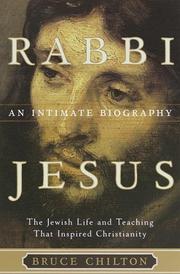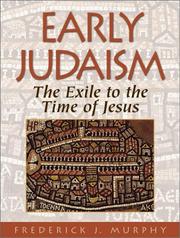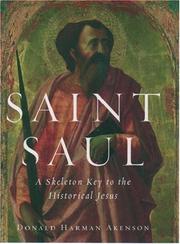| Listing 1 - 10 of 214 | << page >> |
Sort by
|

ISBN: 038549792X 9780385497923 Year: 2000 Publisher: New York Doubleday
Abstract | Keywords | Export | Availability | Bookmark
 Loading...
Loading...Choose an application
- Reference Manager
- EndNote
- RefWorks (Direct export to RefWorks)
"Chilton draws on recent archaeological findings to paint a vivid portrait of the social customs, political forces, and religious beliefs and practices of first-century Palestine. Examining new translations and interpretations of ancient texts against this fresh, historically accurate background, he offers a revolutionary look at Jesus' early life and the philosophical and psychological foundations of the ideas he promulgated as a young man. Chilton provides evidence that contradicts long-held beliefs about Jesus and the movement he led. He shows, for example, that Jesus was born in Bethlehem of Galilee, not Nazareth or Bethlehem of Judea, and that the High Priest Caiaphas, not Pontius Pilate, played the central role in Jesus' execution. It is his description of Jesus role as a rabbi, or "master," of Jewish oral traditions, a teacher of the Kabbalah, and a practitioner of a Galilean form of Judaism that emphasized direct communication with God, however, that casts an entirely new light on the origins of Christianity. By placing Jesus within the context of his times, Chilton uncovers truths lost to history and reveals a new Jesus for the new millennium."--Jacket.
Book
ISBN: 9783506708403 9783657708406 Year: 2022 Publisher: Paderborn : Ferdinand Schöningh, Brill Deutschland
Abstract | Keywords | Export | Availability | Bookmark
 Loading...
Loading...Choose an application
- Reference Manager
- EndNote
- RefWorks (Direct export to RefWorks)
Classification is an inherent feature of all societies. The distinction between Jews and non-Jews has been a major theme of Western society for over two millennia. In the middle of the twentieth century, dire consequences were associated with being Jew ish. Even after the Shoah, the labelling of Jews as "other" continued. In this book, leading historians including Michael Brenner, Elisheva Carlebach and Michael Miller illuminate the meaning of Jewishness from pre-modern and early-modern times to the present day. Their studies offer new perspectives on constructing and experiencing Jewish identity.
Identity as construct --- Jewishness --- Religion
Book
ISBN: 1628371137 9781628371130 9781628371123 1628371129 9781628371116 1628371110 Year: 2015 Publisher: Atlanta
Abstract | Keywords | Export | Availability | Bookmark
 Loading...
Loading...Choose an application
- Reference Manager
- EndNote
- RefWorks (Direct export to RefWorks)
Jesus Christ --- Jewishness. --- Bible. --- Criticism, interpretation, etc.
Book
ISBN: 9782130855606 2130855601 Year: 2023 Publisher: Paris: PUF,
Abstract | Keywords | Export | Availability | Bookmark
 Loading...
Loading...Choose an application
- Reference Manager
- EndNote
- RefWorks (Direct export to RefWorks)
Cet ouvrage essaie d'apporter une réponse à la question : « Qui était Jésus de Nazareth ? », ou plus exactement : « Quel type de personnage religieux était-il ? », afin de clore une énigme qui, rétrospectivement, n'aurait pas dû en être une. La question du Jésus historique a toujours été au cœur de la recherche francophone, et cela depuis Voltaire et les philosophes du siècle des Lumières jusqu'aux spécialistes contemporains. L'étude des rouleaux de la mer Morte et des manuscrits de Nag Hammadi, découverts au milieu du siècle dernier, a pourtant permis de reconsidérer plusieurs aspects des activités et des enseignements que les premiers auteurs chrétiens attribuent traditionnellement au fondateur de leur mouvement. Il ne s'agit plus, pour les historiens, de désolidariser systématiquement Jésus du peuple et du contexte socioculturel qui étaient les siens, mais d'en faire ressortir, au contraire, la judéité pour ainsi dire intégrale. Tous les témoignages anciens convergent en effet en direction d'un Jésus praticien de la contemplation mystique de la Merkava, le trône de la Divinité au ciel, ce qui permet de rendre compte à la fois de son autorité et de son charisme exceptionnels
Jesus Christ --- Biography --- History and criticism. --- Historicity. --- Jewishness. --- Historicité

ISBN: 1565630874 Year: 2002 Publisher: Peabody Hendrickson
Abstract | Keywords | Export | Availability | Bookmark
 Loading...
Loading...Choose an application
- Reference Manager
- EndNote
- RefWorks (Direct export to RefWorks)
Jews --- Judaism --- History --- Jesus Christ --- Jewishness. --- Bible. --- Criticism, interpretation, etc.

ISBN: 0195141571 Year: 2000 Publisher: Oxford Oxford University Press
Abstract | Keywords | Export | Availability | Bookmark
 Loading...
Loading...Choose an application
- Reference Manager
- EndNote
- RefWorks (Direct export to RefWorks)
Jesus Christ --- Historicity. --- Jewishness. --- Bible. --- Criticism, interpretation, etc.
Book
ISBN: 9783170424623 3170424629 9783170424630 Year: 2022 Publisher: Stuttgart Verlag W. Kohlhammer
Abstract | Keywords | Export | Availability | Bookmark
 Loading...
Loading...Choose an application
- Reference Manager
- EndNote
- RefWorks (Direct export to RefWorks)
"Das Lukasevangelium zeichnet seinen Jesus als Juden, der in, mit, durch oder auch gegen die Rituale seiner Kultur wirkt. Durch die Anwendung moderner Ritualtheorien wird ein besseres Verständnis des rituellen Wirkens Jesu im dritten Evangelium mit Ausblicken auf die Apostelgeschichte möglich. Es zeigt sich, dass die rituelle Grundierung, die das ganze Evangelium thematisch durchzieht, von großer Relevanz sowohl für dessen Verständnis als auch für die Erforschung der Ritualwelt des Frühchristentums ist. Das Lukasevangelium bietet relativ gestaltungsoffene Rituale, in auffälligem Gegensatz gerade zum rituellen Rigorismus der römischen Umwelt."
Judaism --- Liturgy --- Jesus Christ --- Jewishness --- Bible --- Criticism, interpretation, etc.
Book
ISBN: 9782204099585 2204099589 Year: 2013 Publisher: Paris Éditions du Cerf
Abstract | Keywords | Export | Availability | Bookmark
 Loading...
Loading...Choose an application
- Reference Manager
- EndNote
- RefWorks (Direct export to RefWorks)
Explorant une période où les parentés entre judaïsme et christianisme étaient nombreuses, le spécialiste en histoire des religions montre que Jésus fut à son époque considéré par beaucoup de Juifs comme une seconde figure divine incarnée en un humain.
Christology --- Jesus Christ --- Relations with the Jews --- Jewishness --- Relations with the Jews. --- Jewishness. --- Iesus Christus D.N.
Book
ISBN: 2841621014 9782841621019 Year: 2005 Publisher: Paris : Edition de l'éclat,
Abstract | Keywords | Export | Availability | Bookmark
 Loading...
Loading...Choose an application
- Reference Manager
- EndNote
- RefWorks (Direct export to RefWorks)
"Cet ouvrage ne se contente pas de relever l'évidence selon laquelle Jésus était un Juif et souhaitait rester dans le cadre de la foi juive, mais il soutient aussi que, sans le long travail préparatoire de la foi juive de l'époque, l'enseignement de Jésus aurait été impensable. " Jésus devient alors ce " frère universel qui tend une main des deux côtés, aux juifs d'une part et aux chrétiens de l'autre ", comme l'écrira Martin Buber. Dans la lignée des travaux de Joseph Klausner, David Flusser a consacré sa vie aux recherches croisées sur le christianisme et le judaÏsme. Cette surprenante " vie de Jésus ", fondée sur les plus récentes découvertes archéologiques et philologiques, est parue à Jérusalem en 1997, et constitue une édition entièrement revue et augmentée de dix chapitres d'un ouvrage plus ancien qui avait déjà renouvelé en son temps les études sur Jésus.
Judaism --- Judaïsme --- Relations --- Christianity --- Christianisme --- Jesus Christ --- Biography --- Sources, jewish --- Historicity --- Jewishness --- Judaïsme --- Sources, jewish. --- Historicity. --- Jewishness.
Book
ISBN: 3534189280 Year: 2005 Publisher: Darmstadt Wissenschaftliche Buchgesellschaft
Abstract | Keywords | Export | Availability | Bookmark
 Loading...
Loading...Choose an application
- Reference Manager
- EndNote
- RefWorks (Direct export to RefWorks)
Christian theology --- Jesus Christ --- anno 1800-1999 --- Theology, Doctrinal --- History --- Jewishness --- History of doctrines
| Listing 1 - 10 of 214 | << page >> |
Sort by
|

 Search
Search Feedback
Feedback About UniCat
About UniCat  Help
Help News
News